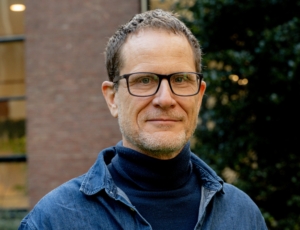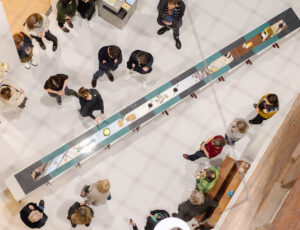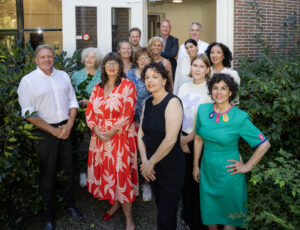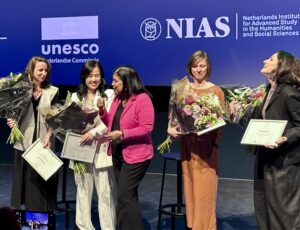Open Access never fails to arouse emotions and tends to split the academic community along the fault lines of the different disciplines. As an international and interdisciplinary institute, NIAS provides a safe-haven where such contentious topics can be freely debated. Biannual seminars are organised on the topic of Open Access where the NIAS Fellows can exchange experiences and voice their concerns and opinions. This year we invited two speakers, who are well acquainted with Open Access, to give a short presentation.
Saskia Woutersen-Windhouwer, Specialist Electronic Publishing & Repository Manager at the University of Amsterdam, began proceedings with a succinct introduction and description of the different ways to publish in Open Access such as the Golden and Green Road. Roberta D’Alessandro, Professor of Italian Linguistics LUCL Leiden and member of the Young Academy (KNAW), gave an engaging account of the practical experiences of using Open Access from the perspective of a researcher and her students. Both presentations are available on NIAS’ slideshare page.
Aafke Hulk, Rector of NIAS, opened the floor and led the discussion. Then NIAS researchers and guests were invited join a debate centred on the following propositions:
1) Open Access Journals will never have the status of high impact journals and this damages the careers of young researchers
2) It is my university’s responsibility to pay for and facilitate publishing in Open Access
3) I am paid by society so all my data should be available to all
NIAS Fellows discussing the dangers and opportunities of Open Access publishing.
It quickly became clear that researchers’ experiences varied greatly according to their discipline. Mathematician and Distinguished Lorentz Fellow, Henk Barendregt, regularly publishes in Open Access via the Golden as well as the Green road whereas researchers from the Humanities said they found it difficult to find the funds to pay for publishing via the Golden Road and they were worried about the status of publishing via the Green Road.
This led to a lively discussion about peer review, the quality of reviewers and the impact of the review procedure on the status of a publication. The status of publications was seen as being particularly relevant as this one of the factors that contributes to the chance of a researcher being awarded a grant. Roberta D’Alessandro said that she was more likely to publish in Open Access as she had a position but would sometimes choose traditional routes for her linguistics students who were making their way. Although others said that young researchers from the beta disciplines are more likely to take the risk of publishing via the Green Road. One of the reasons being that this can be much quicker than traditional publishing route and Saskia Woutersen explained the advantages of getting a date stamp via the pre-print and post-print facility.
During a discussion on the issue of intellectual property and the power of publishers to enforce embargos it came to light that pressure from scholars had forced Elsevier to change its policy. Elsevier now did allow post prints, although Wiley & Blackwell was still very restrictive. It was clear that even when researchers were willing, for them identifying the best route to publish and making sure that all the right boxes were ticked in publishing agreements was like trying to hit a moving target. Nevertheless, as Saskia Woutersen stressed, it is vital to be aware about handing over copyrights so it is time well spent to check publishing agreements carefully. The consensus was that universities should provide support and advice for researchers.
Harold Cook, KB Fellow and historian, raised questions about the cost of publishing books in Open Access particularly as books were an essential mode to disseminate historical knowledge. He was able to put his question directly to Joed Elich, Publishing Manager Middle East, Islam & African Studies at Brill who told the audience that Brill had published ten online books with extra funding from NWO.
Rosemary Wakeman, historian and NIAS Fellow remarked on the illusion that Open Access is free – “nothing is for free” and she expressed her concerns that the Open Access system was creating a two-tier system within universities where funding is shifting from library subscription but is placing a burden on the PhD students who are now doing all the labour for free without chance of tenure. Harold Cook also warned that the funding system should be examined thoroughly to avoid a situation where one player has control over all aspects of research, teaching, publishing and sales as is the case for the Welcome Trust in the UK.
Louis Fono, NIAS Fellow and mathematician from Cameroon reminded everyone that the discussion of shifting the burden of funding was a luxury. In Cameroon there is no money within universities for subscriptions or for Open Access. His access to publishing in Open Access was to have a co-author in Europe. Saskia Woutersen stressed that anyone in his position should apply to publishers for a waiver and that she had been successful in obtaining waivers for students who could not pay in the Netherlands.
So although some researchers saw Open Access as potentially democratic others were acutely aware of the practical and sociological pitfalls. David Stark, Sociologist from USA, concluded the afternoon by widening the discussion even further to include the issue of open reviews. In his view, these developments herald a ‘sea change’ in the world of publishing. The texts of the future will be probably be written by multiple authors. “How will we look back on this discussion in 20 years. Will there still be a place for the individual author” he asked.
In summary, the afternoon raised more questions than it answered but illustrated that Open Access raises both opportunities and obstacles that researchers in the field have to cope with. Exchanging experiences and creating a source of practical advice for researchers is an essential resource during this period of transition.
Speakers Roberta D’Alessandro (centre), and Saskia Woutersen (right) in conversation with fellow Georgi Verbeeck.



